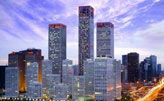Politics
Tougher penalties for drivers who drink
Updated: 2011-05-09 07:12
By Hu Yongqi, Duan Yan and Wang Yan (China Daily)
Liu Shuang, head of the traffic police team in Dongwai Dajie area, said drinking one bottle of beer, over two hours, will usually produce an alcohol level of 30 mg.
According to the newly amended Road Traffic Safety Law, a drunken driver's license will be revoked and the driver must wait five years before applying for a new license. The penalty applies to any driver with 20 mg alcohol or above.
|
|
The previous regulation stipulated fines of up to 500 yuan and the suspension of the driver's license for three to six months.
Since May 1, nine people in Beijing have been arrested for driving with blood alcohol levels of 80 mg or more. The first goes on trial on Monday.
Nobody tested drunk Thursday night at Nongzhan Bridge, and the breath tests showed that eight of the 300 or so drivers who were checked in 2 hours had been drinking, but their blood alcohol "scores" were below 20.
All 7,000 traffic officers under the Beijing Traffic Management Bureau took part in the crackdown, and each inspection team consisted of five officers and seven assistants, who kept traffic moving around the checkpoints. In all, about 16,000 people worked at about 1,400 checkpoints throughout Beijing. The campaign continued on Friday from 6 am to midnight, and no one was arrested for drunken driving.
Growing threat
The number of cars and other vehicles in China is rising quickly - an average of 15 million automobiles have been added annually over the past five years - and with it the number of accidents. Fatal crashes have become a major cause of death for Chinese people under 45.
The Ministry of Public Security said more than 65,000 people were killed in traffic accidents last year. Police caught 526,000 drunken drivers in 2010, a year-on-year increase of 68 percent.
With traffic police out in force this Labor Day holiday, the number of traffic accidents dropped by 18.6 percent from last year. Even so, 423 people were killed and 1,740 injured in 1,459 traffic accidents nationwide from April 30 to May 2, the ministry said in a statement on Wednesday.
Potential problems
The tougher punishment for drunken driving has increased the risk of confrontation with police officers who are enforcing the law. In one recent, though extreme, case a drunken driver in North China's Shanxi province bit a police officer's hand in an attempt to avoid an alcohol test.
In Beijing, the officers who worked at the checkpoints were equipped with video recorders, tear gas and handcuffs, among other tools. They also had 10-meter nail strips designed to puncture the tires of a fleeing car.
At the Nongzhan Bridge checkpoint, one driver's breath test showed that he had 4 mg of alcohol for each 100 ml of blood. He said he had not drunk any alcohol. A police officer suggested he have a sip of water, and a second test showed no alcohol in his body. Police will take a blood sample from a driver whose breath test indicates 80 mg of alcohol or more.
Since May 1, rumors have spread on the Internet that some food and medicine containing a little alcohol may result in drunken driving. Police said drivers should not drive in the first hour after ingesting such a substance, but that the alcohol content is small and will metabolize quickly.
One driver interviewed in Beijing, who did not want to be identified, asked, "What if the police selectively detain individuals with less political power and connections and let drunken driving government officials go?"
To avert interference by powerful people, traffic officers have been ordered to leave their mobile phones at home when they are working at a checkpoint. And they are not allowed to pick up any driver's mobile phone, in case someone the driver knows would be on the phone, asking that a drunken driver be let go.
A policeman who asked not to be identified told China Daily that the police are not eager to see drunken driving. "It puts all people, including drivers, riders, passengers and their families, at high risk."
Specials

Sino-US Dialogue
China and the US hold the third round of the Strategic and Economic Dialogue from May 9-10 in Washington.

Refreshingly beautiful
Gaoligong Mountain offers a pristine environment for climbing, exploring ancient Southern Silk Road trails.

Building communities
The architect's forays into China began in the 1980s when he designed the nation's first multifunctional real estate property, Shanghai Center.
